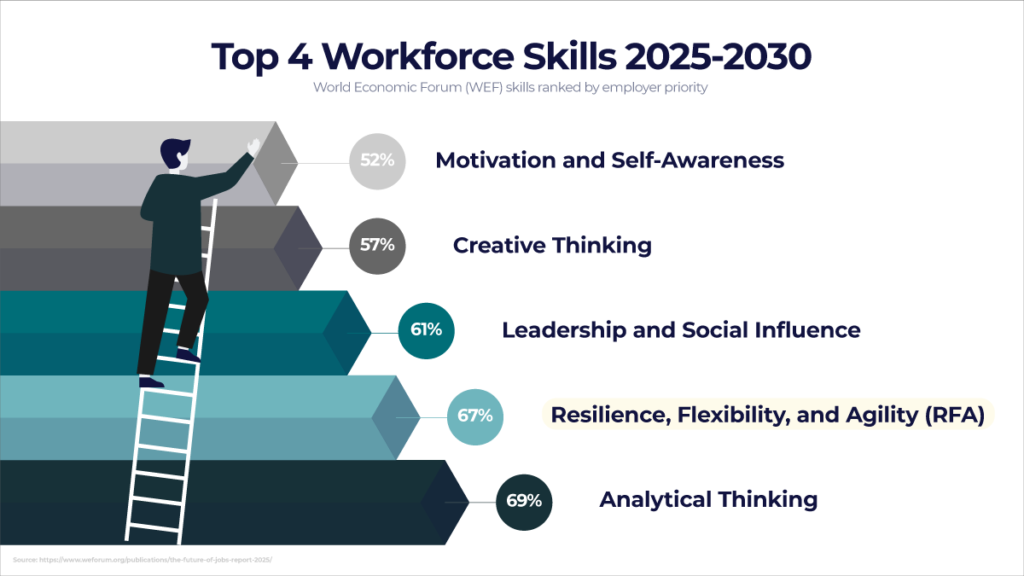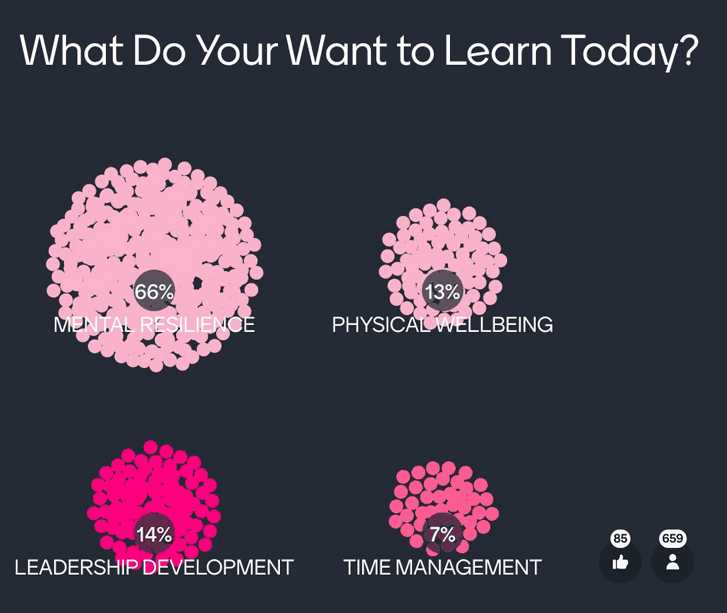What Does the Future of Work Look Like?
The World Economic Forum (WEF) has provided a compelling glimpse in their 2025 Jobs Report. This highly anticipated report outlines what employers consider the most critical skills for workforce success now through 2030.

While analytical thinking leads the pack, what’s truly noteworthy is that Resilience, Flexibility, and Agility (RFA) ranks second—surpassing traditionally emphasized skills like leadership, creative thinking, and motivation. These findings signal a fundamental change in how organizations view workforce capabilities. But why this dramatic shift?
RFA is Indispensable in Current Conditions
RFA equips people with the capacity to manage change, cope with the uncertainty of disruption, refuel depleted emotional energy, and stay focused on what drives growth. The report doesn’t clearly define RFA elements, but in the workplace, they represent the mental skills to:
🔹 Resilience: Reframe challenges, creating sustained high performance under pressure.
🔹 Flexibility: Break from old perspectives, delivering creative solutions when conditions change.
🔹 Agility: Make and execute decisions rapidly in complex situations, seizing more opportunities and preempting crises.
Plus, RFA addresses an inner struggle many leaders often face—the tug of war between pressure and principle.
Managing the Productivity–Burnout Dilemma
Leaders often feel caught between two seemingly competing imperatives: delivering outstanding business results and protecting their teams from overload and burnout.
RFA offers a powerful solution. By prioritizing these core capabilities, leaders can simultaneously prepare their people to manage and excel in challenging conditions and show a sincere interest and investment in their peoples’ mental health and overall wellbeing.
Plus, the demand for RFA skill development is not just coming from employers.
The Audience Demand for RFA
In recent keynote presentations, I polled the audiences with, “What do you want to learn today?” My presentation topic, The 4 Mantras of Highly Resilient People, biases the results, of course. However, the responses are still worth considering. This slide is from a keynote presentation with over 700 health insurance professionals.

The preference for mental resilience training aligns with the WEF’s findings and reinforces what many of us are experiencing; professionals at all levels recognize the critical importance of building these skills.
Making Strategic Choices for Your Organization
For leaders and event planners needing to choose development priorities and conference themes, this data provides clear direction. Selecting RFA isn’t just a safe choice, it’s a strategic one backed by both global research and direct feedback from professionals.
This evidence-based approach reduces the risk associated with choosing where to spend professional development budgets while aligning with multiple organizational priorities:
- performance excellence
- enhancing organizational culture
- talent retention
- change readiness
- sustainable growth
- employee well-being
Moving Forward
The future of work demands more than just technical expertise or traditional leadership skills. It requires a workforce that can adapt, recover, and thrive amid constant change. By prioritizing RFA development, organizations can build teams that are not only more capable of handling today’s challenges but are better prepared for tomorrow’s opportunities.
The data is clear: RFA isn’t just another skill set—it’s becoming the foundation of workplace excellence. The question isn’t whether to prioritize these capabilities, but how quickly you can begin developing them within your organization.
How is your organization approaching resilience, flexibility, and agility development?
I’d love to hear your thoughts and experiences in the comments below.
Source: https://www.weforum.org/publications/the-future-of-jobs-report-2025/
